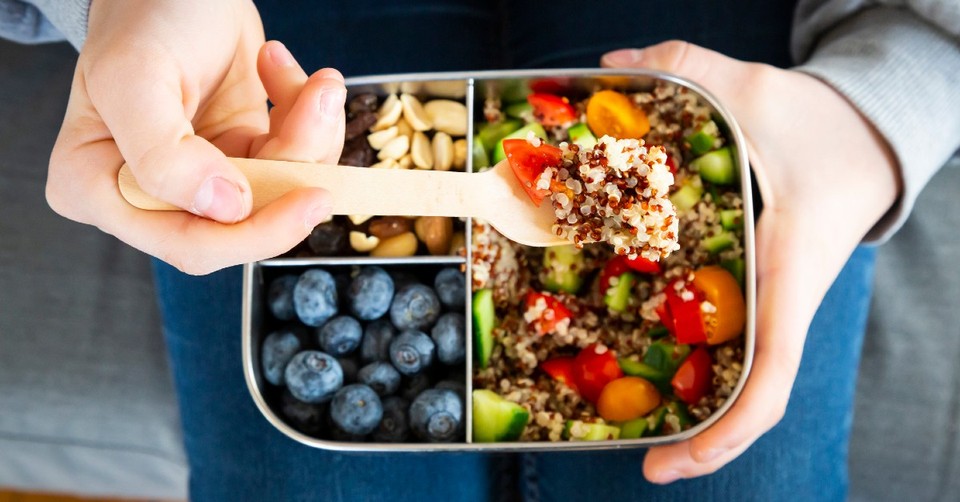What Does the Bible Say about Food and Eating?

When we talk about addictions and perspectives, many times what comes to mind is alcohol, drugs, or shopping. However, one of the most common struggles, especially in the Western world is unhealthy views of food. God’s Word has answers for everything. What does the Bible say about food and eating?
What Does the Bible Say about Food?
Food is one of the best gifts that God has given to us. It fuels our bodies, brings people together around a table, nourishes us, and gives us happiness. Food is not the problem, but our boundaries and issues revolving around food are the problems we face when it comes to eating.
Bible Study Tools shares some verses about food:
Genesis 1:29: “Then God said, 'I give you every seed-bearing plant on the face of the whole earth and every tree that has fruit with seed in it. They will be yours for food.'”
Ecclesiastes 9:7: “Go, eat your food with gladness, and drink your wine with a joyful heart, for God has already approved what you do.”
John 4:34: “My food,” said Jesus, “is to do the will of him who sent me and to finish his work.”
What Does the Bible Say about Food Christians Can Eat?
There were many rules in regard to what could be eaten and what could not in the Jewish laws. Once Jesus came, these rituals for cleanliness were no longer needed. There was a newfound freedom in no longer sacrificing animals as offerings and no longer worrying about food that was unclean. However, there was still wisdom in deciding what food to eat and ultimately glorifying God in those choices.
Food Presented to Idols:
My husband and I have friends from different cultures who actually cook for their gods in idol worship for festivals and holidays. Although the food is essentially just food, because of the purpose of the food, we feel convicted not to partake in eating. However, there is the freedom to partake in the food because it is about the heart behind it.
“So then, about eating food sacrificed to idols: We know that 'An idol is nothing at all in the world’ and that ‘There is no God but one’” (1 Corinthians 6:4). The rest of 1 Corinthians 6 continues with the struggle of whether or not they could eat food presented in idol worship in the temple. Their conclusion was that food was just food, but if ultimately their decisions caused others to stumble, it was not worth eating. “Therefore, if what I eat causes my brother or sister to fall into sin, I will never eat meat again, so that I will not cause them to fall”(1 Corinthians 6:13).
What we eat does not determine our salvation, but it can reveal where our hearts are at in life. It would not be wrong for my husband and me to eat the food offered to idols we believe to be non-existent; however, if we know it hurts our witness for Christ to others, we place that as our priority.
Meat:
We know that before the fall of mankind, humanity lived on plants and seeds (Genesis 1). However, meat has become a staple diet in many parts of the world. 1 Corinthians 10:13-33 talks about a believer’s freedom, specifically on the subject of food.
Dr. Roger Barrier from Crosswalk shares, “I believe that God's original intention was for us to be vegetarians. In Genesis before the fall into sin, God gave Adam and Eve the responsibility of caring for the Earth. He specifically gave them plants and vegetables to eat.” He later shares, “The Apostle Paul was in the process of settling a dispute… Paul counseled both groups to eat the meat and not worry about it”
Meat which was formerly a no-no for the people of God became a yes after Christ. 1 Corinthians 10:25-26 says, “Eat anything sold in the meat market without raising questions of conscience, for, ‘The earth is the Lord’s, and everything in it.’” Many times people need the health benefits that come from meat. Our fallen bodies do not necessarily operate as well as Adam and Eve in the garden.
Does the Bible Talk about Eating Healthy?
The Bible encourages healthy eating and having a healthy relationship with food. Many times it can be easy to separate food from our relationship with the Lord. However, inviting God into our health decisions enables us to think from a spiritual perspective.
Whitney Hopler from Crosswalk shares some basic tips for living a healthier lifestyle. “Ask God to give you the desire to be healthy, use cravings as promptings to pray, create a plan to change, fill your mind with Biblical truth, move your body, call sin what it really is, recognize emotional triggers, and let yourself be hungry for holiness.”
The Scriptures reveal eating too many sweets is not good for you. Proverbs 27:7a says, “It is not good to eat too much honey…”
The Bible makes it clear that whatever we eat or drink, we do for God’s glory. Does the Lord take delight in us eating ice cream? I’d like to think so. Does he smile on us if we overeat ice cream daily? Probably not. Just like anything good can become an idol, food can be a special treat, but in excess becomes a stumbling block to us.
On the other hand, if we are avoiding food and becoming malnourished out of reasons for beauty or control, we can also dishonor God with what we are not eating or drinking. There is such a balance when it comes to health. At the end of the day, I think it comes down to, did I honor God with my choices today? If there was an area of excess, set some portion control. If there was some obsessive avoidance of food, relax and rest in freedom to partake.
1 Corinthians 10:31 says, “So whether you eat or drink or whatever you do, do it all for the glory of God.”
Why Does Food Play Such a Big Role in the Bible?
Food has such a large impact in the Bible because food is a symbol of God’s provision for people. When I think about manna from Heaven that came down each day for the Israelites, or even Jesus calling Himself the “Bread of Life.” Food plays a role in affirming the character trait of God is our Jehovah Jireh (The Lord Provides).
Just like a child can complain about vegetables, the Israelites in Scripture were not happy with what God gave to them. So many times our sin around food can be the ingratitude we carry. There are people around the world who will not eat today. This is a major problem. This is not because God does not love them, but this is because of sin in the world. We can be a part of the solution in our giving and prayer. Then, we can be over or under-consuming the food that has been so graciously given to us. We sin when we are gluttons and when we are prideful with self-image. The balance can be tricky, so this is why we pray and ask the Lord to help us navigate our decisions.
I do believe going back to the garden and doing our best to eat fruits and vegetables each day will greatly benefit our bodies. Portions can help us not to overeat. Occasional desserts can be treats that we enjoy. We can have the fullness of joy found in Christ. Our identity will not be in the food we intake, but in the God we are glorifying.
Photo credit: ©Getty/Westend61
Originally published October 11, 2021.







